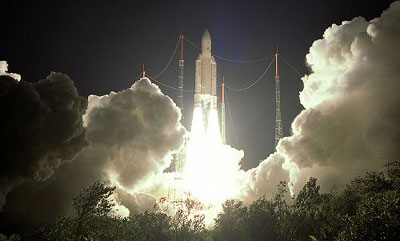Making the case for Ariane 6by Taylor Dinerman
|
| For reasons of national prestige and employment policy, France considers having independent European access to space as in their national interest. |
Ariane 5 has not proven a total commercial failure like (so far) Boeing’s Delta 4, but of course no one knows exactly what price Arianespace has to offer customers in order to effectively compete with launchers like the Soyuz and Proton. The company is profitable, perhaps due to its ability to charge high prices to the French and other European governments for its services. There are no near-term market developments that will change this situation; if there are, they are amazingly well hidden.
However, now that the Ariane 5 ECA version is operational, or at least as operational as any current space launch vehicle ever gets, the team that designed and developed it is looking for something else to do. Without a major new project they will probably be disbanded. Le Gall’s article is au fond a plea to the French government—disguised as “Europe”—to begin preparatory work on a new launch vehicle, which for the sake of argument we will call Ariane 6.
Europe today is already working on a new launch vehicle, the Vega. The work is being led, mostly paid for, and accomplished in Italy, with some support from other European governments. Le Gall points out that the Ariane system “…rests on two legs, production and development, and if one disappears the whole system will collapse.” In fact Europe has been working on a number of launch projects beyond Vega, such as the privately-funded British Starchaser and other X Prize-type vehicles and, of course, France’s new generation of solid-fueled submarine-launched ballistic missiles. Europe is not running out of launch expertise.
The Ariane 5 ECA is the only launcher on the market today that can reliably put two heavy commercial communication satellites into geosynchronous orbit. It is also the primary vehicle for Europe’s current and future military space ambitions. After a few initial failures and cost overruns, which are almost inevitable in this business, it has become a valuable piece of technology. Under the circumstances it will be supported by Europe’s governments, mostly France, for a long time to come. The question that Arianespace wants answered is how soon will the governments of the EU want a replacement? It seems there is a mismatch between the long-term requirement for a next-generation expendable launcher and the need to keep the design team up and running. If a brand new rocket is not required for another fifteen or twenty years, it hardly makes sense to begin serious work on it now.
In December ESA will hold a ministerial meeting to hash out the budgets for a number of Europe’s future space programs, including Galileo, the Aurora space exploration project, and the GMES Earth observation system. At a time when all budgets are tight and when the new German government has announced a major tax increase, there may be little appetite for increased spending on launcher development.
| The question that Arianespace wants answered is how soon will the governments of the EU want a replacement? It seems there is a mismatch between the long-term requirement for a next-generation expendable launcher and the need to keep the design team up and running. |
Over the next decade the fate of Ariane 6 may depend more on how much Europe wants to dedicate to the Aurora program of solar system exploration. While they may follow the US example and invest in Russia’s Kliper spacecraft, or may decide to try and turn the ATV cargo carrier into a manned spacecraft, eventually they will need a heavy-lift rocket comparable to the US “single stick” Crew Launch Vehicle now under development. If they really do want to develop independent access to the Lunar surface they will probably need a heavy launcher. They could follow an ISS-type architecture and fly their future lunar missions using multiple Ariane 5 launches, but after they analyze the alternatives they will likely find that the US solution is the only one that makes sense.
Europe’s space leaders might find it easier to commit their successors to an ambitious and expensive program than to increase funding for major space projects in the near term. In any case the question of whether or not to begin work on Ariane 6 will probably not be made for another few years.
